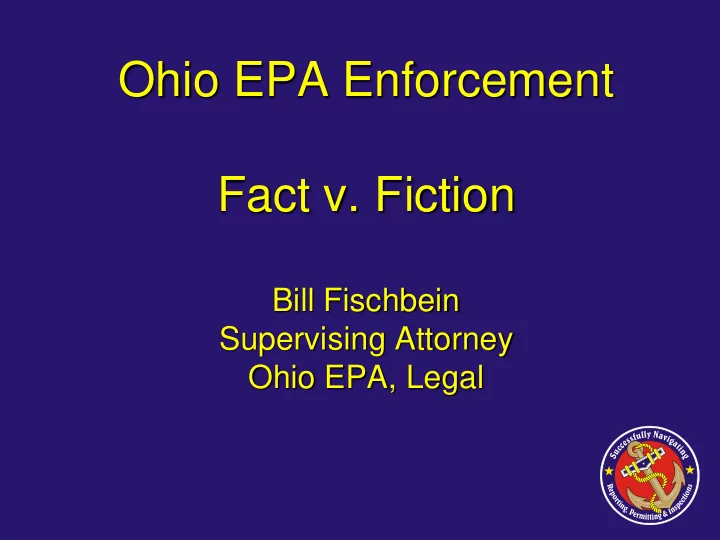

Ohio EPA Enforcement Fact v. Fiction Bill Fischbein Supervising Attorney Ohio EPA, Legal
“Every violation found by Ohio EPA will require payment of a penalty”
The Facts Most violations are addressed and corrected without a formal enforcement action and thus no penalty.
“Ohio EPA gets most of its budget through the penalties collected from businesses, so it’s in the Agency’s best interest to fine as many companies as possible.” False!
The Facts Ohio EPA’s total operating budget is about $180 million annually. In 2006, Ohio EPA /Attorney General’s Office obtained $6,176,326 in penalties which is about 3.4% of the Agency’s overall budget.
The Facts And, although some of this money is redirected to Ohio EPA, a portion of penalty dollars also goes toward funding Ohio’s Environmental Education Fund (OEEF). The OEEF provides grants for environmental education/outreach projects.
“Ohio EPA inspectors have the authority to issue a penalty to a company on the spot for violations found during an inspection.” False!
The Fact Do issue Notice of Violations No authority to issue “tickets”
“Ohio EPA inspectors have a “traffic cop” mentality and are just in the field to cite violations.” False! (in part)
The Facts • Compliance is the focus of inspections. • Most violations are corrected and never rise to the level of an enforcement action. • Underlying reasons for the inspection.
“Ohio EPA’s enforcement/penalty process does not take into account that a small business operation cannot pay the same penalty as a giant corporation. Environmental penalties frequently bankrupt small businesses.” False!
The Facts Penalty Factors • Seriousness of the violation • Level of effort in addressing violations • Ability to pay Goal: Deter violations and not allow economic benefit of non-compliance
Dealing Effectively Respond - seems obvious, many just ignore notices. Gather Information - find out the information the agency is relying on. These are allegations…find information we missed. Work within our framework - Penalty policies and the staff assigned.
Priority Cases Protecting Human Health Protecting the Environment Programmatic Integrity Failing to Sample Industry wide non compliance
Types of Formal Enforcement Director’s Findings and Orders Judicial Enforcement (i.e. Court) Criminal Enforcement Falsification Disabling control equipment Dumping hazardous waste
Case Development Most cases are referred from district offices Staff evaluate best course of action and recommend to Director
Enforcement Process Letter Settlement discussions Resolution (or not) If no resolution, what are the next steps?
Proactive Approach Ohio’s Environmental Audit Privilege Law Voluntary Approach Benefits to Be Gained – Privilege and Immunity
Privilege Privileged with respect to both of the following: Contents of an environmental audit report; and Contents of communications between the owner and those associated with conducting the audit.
Immunity Immune from any administrative and civil penalties for the specific violation voluntarily disclosed; Not immune from criminal violations; Not immune if violation resulted in significant economic benefit.
Considered “Voluntary” if: Disclosure is not otherwise required by law; Do not know or have reason to know that government has commenced an investigation or enforcement action.
Considered “Voluntary” if: Good faith effort made to achieve compliance as quickly as practicable; Compliance is achieved as quickly as practicable or within such period as is reasonably ordered by the State;
Ohio EPA Audit Process Investigation/Follow up Letter regarding Ohio EPA’s perspective
Governor’s Executive Order Executive Order 2008 – 04S Implementing Common Sense Business Regulation Requires state agency to adopt policy for waiving, where appropriate, penalties for “first -time or isolated paperwork or procedural regulatory noncompliance” Bill with similar provisions introduced in General Assembly
Recommend
More recommend